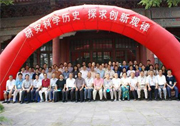| 中文题目: | 中国现代物理学研究的兴起——燕京大学物理系与洛克菲勒基金会 | ||||||
| 英文题目: | The Emergence of Modern Physics Research in China: The Yenching Department of Physics and the Rockefeller Foundation | ||||||
| 作 者: | 胡大年 | ||||||
| 刊物名称: | Chinese Annals of History of Science and Technology | ||||||
| 发表年度: | 2019 | ||||||
| 卷: | 3 | ||||||
| 期: | 2 | ||||||
| 页码: | 4–61 | ||||||
| 中文摘要: | 根据在美、英、中三国发现的原始档案材料,本文仔细考察了此前完全被忽视的协和医学院预科学校物理系的短暂历史,并揭示了该系与燕京大学(简称燕大)物理系之间的密切联系。本研究还深入调查了创立于1927年的燕大物理系硕士研究生项目,这是中国第一个物理学研究生项目。正是这一研究生项目,将燕大物理系由一个主要帮助协和医学院准备合格医科学生的培训中心,转变成为中国物理学研究工作的一处重要发源地。燕大物理系的教授很少而且历史短暂,然而从那里却走出了许多杰出的中国物理学家,如孟昭英、张文裕、王明贞、袁家骝、王承书、卢鹤绂、葛庭燧、黄昆和谢家麟。这些突出成就的取得与该系头四位系主任郭查理、安德森、谢玉铭和班威廉的富有成效的领导和开拓性工作密不可分,同时也得益于相对充裕的、主要来自美国的私募经费以及与西方教育机构的深厚联系。本文不仅详细介绍了这四位物理系的领军人物及其贡献,而且展示了洛克菲勒基金会通过中华医学基金会与协和医学院在燕大物理系发展过程中所发挥的独特作用。
|
||||||
| 英文摘要: | Based on archival materials discovered in America, Britain, and China, this paper carefully examines the history of the short-lived and completely overlooked Department of Physics in the Premedical School of Peking Union Medical College (PUMC), and uncovers this department’s extensive interconnections with its counterpart at Yenching University. This project also looks into the Master of Science (MS) program in the Department of Physics at Yenching University, which, founded in 1927, was the first graduate program in physics in China. It was this MS program that transformed the Yenching Department from a largely premedical training center serving the PUMC into a prominent cradle of Chinese physics research. This Yenching Department, despite its small faculty and brief existence, nurtured many eminent Chinese physicists, such as Chao-Ying Meng 孟昭英, Wen-Yu Chang 张文裕, Ming-Chen Wang 王明贞, Chia-Liu Luke Yuan 袁家骝, Cheng-Shu Wang (Chang) 王承书, Ho-Fu Lu 卢鹤绂, Ting-Sui Ke 葛庭燧, Kun Huang 黄昆, and Chia-Lin Hsieh 谢家麟. It would have been impossible to achieve these outstanding accomplishments without the effective leadership and pioneering work of C. H. Corbett, P. A. Anderson, Y. M. Hsieh, and W. Band—the first four Department Chairs—in combination with relatively abundant private funding, mostly from America, and extensive educational connections with Western institutions. This paper not only introduces in detail these four department heads and their contributions, but also discloses the unique role played by the Rockefeller Foundation via the China Medical Board and the PUMC in the development of the Yenching Department of Physics. |
||||||





